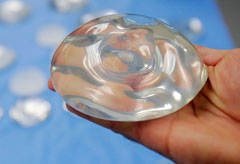PIP scandal may involve 7,000 more British women
Health secretary pledges NHS help and women urged to seek advice from their GP as tests show that industrial grade silicone was used to fill implants for a longer time period than first thought

Celebrity news, beauty, fashion advice, and fascinating features, delivered straight to your inbox!
You are now subscribed
Your newsletter sign-up was successful
Health secretary pledges NHS help and women urged to seek advice from their GP as tests show that industrial grade silicone was used to fill implants for a longer time period than first thought
About 7,000 more British women may be affected by the recent PIP implant scandal according to the government.
Tests suggest that thousands more women could have received the faulty implants than previously thought and Health Secretary Andrew Lansley is urging all women who received PIP implants before 2001 to see their GP.
'The French regulator has confirmed this week that more women may be affected by the criminal activity of the French breast implant manufacturer PIP,' says Mr Lansley.
'These women are the victims of a fraudulent company and I know this situation is causing a huge amount of anxiety.'
More than 40,000 women in the UK were already thought to have had PIP implants filled with industrial grade silicone, which is used in mattresses.
But in response to questions from the UK regulator, Medicines and Healthcare Products Regulatory Agency, the French authorities have suggested the scandal may have begun before 2001, potentially affecting a further 7,000 women.
Celebrity news, beauty, fashion advice, and fascinating features, delivered straight to your inbox!
'I want to reassure those affected by the news today that they will be provided with all the help they need from the NHS,' says Mr Lansley.
'Our commitment is to ensure support for all women from the NHS if needed; we will continue to press for the same standard of care from private providers.'
PIP founder, Jean-Claude Mas, is in prison awaiting trial. The company, which is now bankrupt and closed, began selling the implants called Silopren, in 1992.